I want to talk about world building in fantasy novels and Keira Drake’s apology.
The Continent by Keira Drake has gone from a book I knew zero about to the only thing on Book Twitter™. The Continent follows Vaela Sun, who is gifted a tour of the Continent for her sixteenth birthday. When her plane crashes, she becomes the lone survivor of her trip, left stranded and left alone to survive in the land locked in battle for centuries. The novel is slated to be released on January 3rd by Harlequin Teen.
For those who may have missed it, various authors were tweeting about the problematic content within The Continent on the morning on November 3rd. After that, author Justina Ireland requested a review copy and live tweeted her reaction to its content.
There are two camps. One feels the “social justice warriors” should stop talking about the problematic content in The Continent and are screaming “censorship.” The other wants the publishers to delay release and give the book another editing pass with actual sensitivity reads with this petition. I agree with the latter.
There is no vendetta against Keira Drake. Neither the original posters or Justina Ireland tweeted at the author or messaged her at all. Drake did send Justina Ireland direct messages on Twitter. Drake has issued an apology. Currently, her husband is Tweeting at anyone willing to disagree.
Drake is a debut author. I know what it’s like to be a debut. I know the pain of writing the book of your heart. The nerves, the pressure, the hopes that we pour into our work. But being a debut isn’t a free pass when it comes to criticism. Most authors would agree with me that the scrutiny on our words gets more severe down the line. It is not enough to call a book racist and move on. Six months from now, another book will take the place of The Continent, and the rage cycle will resume. So where do we go from here? I think breaking down fantasy world building and examining Drake’s apology can be the start to a solution for Harlequin Teen.
Let’s start with writing fantasy novels. Writing fantasy is hard. You have to go up against the heavy hitters, the Tolkiens and Rowlings and Martins of the world. On top of an original plot, you need an original world, gripping characters, and something that makes it unique to you instead of regurgitating Game of Thrones.
Fantasy is a genre in which the characters and world take place in an imaginary world, usually (but not always) involving magical creatures and elements. Fantasy = Magic. Scifi = Technology. Things cross pollinate and blend and you end up with a zillion subgenres. (Before anyone wants to explain to me that my definition doesn’t encompass X and Y, relax. We’re getting really basic right now.)
The Continent falls in science fantasy. There is no magic and made up tech like “heli-planes.” Vaela Sun lives in a Utopian world where there is no violence, except in the Continent which is full of “savages” still at war.
For those of you who haven’t read The Continent, the Continent as titled in the book has two warring tribes: the Topi and the Aven’ei. The Topi are described as having “reddish-brown” skin, “painted faces”, and faces with “broad with hard angles.”
…I mean, this isn’t a great leap of logic here…
— Justina Ireland () November 3, 2016
Growing up in the United States, it isn’t a big stretch to use these descriptions to bring to mind stereotypes used to describe Native Americans. Pairing the Other with savagery is also a heinous stereotype. As the author made a claim to have Native American ancestry (though not a specific nation), this should be apparent. Drake explains the origins of her Topi tribe in her “apology” post entitled “The Continent – First Response.”).
“The Topi, one of the native peoples who inhabits the Continent, were inspired by the Uruk-Hai in Lord of the Rings. LotR is one of my favorite books, and the savage, brutal nature of the Uruk-Hai breaks my heart every time I read it, which is at least once per year. The Topi are a savage people—they are in no way inspired by or meant to represent Native Americans. Like many, I am a person of mixed nationality and race (Sicilian, Native American, French, Irish, Danish), and take great interest and pride in my ancestry.”
[“The Continent – First Response.” post is available as a .pdf.]
When Keira Drake says that she modeled her world on fictional people, there’s a flaw. The Uruk-Hai are technically not people. They’re Orc and man. They’re violent. They’re fodder and nameless. But they’re also not sad. Orcs are not given names or speaking parts in contrast to the Fellowship and their allies. They’re a nameless army created by an evil wizard. They’re evil fodder to make Aragon grow into the Once and Future King–I mean -Heir of Isildur and bring forth the Age of Man. Orcs are beastly and hideous and the darkness to the white race of Man, portrayed by Tolkien and brought to life by the very white films. How else can you show the “goodness of Men” if not by contrasting them to a thinly veiled race of dark-skinned monsters?
I do love the Lord of the Rings, but it has its racial issues as well. The Topi in The Continent are not Orcs. They’re described as human.
Keira Drake claims to be partially Native American, which still does not excuse the stereotype. According to my Ancestry.com results, I’m 8% African, but that doesn’t give me the authority or background to write about a fictional Black tribe from a coastal desert land. The idea that Drake, claiming to be part Native American, didn’t see the connection and similarity between the words Hopi and Topi shows a disconnect with Native Americans and First Nations. The creation of the Topi relies on the construction of our human descriptions. As fantasy readers or writers, we fancast. We see the actors and setting in our minds by what’s described on the page. We know if we’re basing things off of other cultures.
In her apology, Drake says, “Any likeness of the fantasy cultures in the book to actual cultures was unintentional, and was not brought to my attention by a large number of early sensitivity readers.” Since Drake did not base the Topi on a Native tribe, were her multiple sensitivity readers only Asian? African-American?
What sort of sensitivity readers do you get for a book where one tribe is based off Tolkien’s hybrid monster army? If Drake is claiming to have multiple sensitivity readers, but also claims to not have based the book’s races on human races, how can someone sensitivity read without intent?
As Drake is also of Irish ancestry, she knows of the negative “drunken” stereotype associated with Irish men. Other races said to be drunks are African Americans, Latinxs, and Native Americans. In The Continent, the Topi have a scene where they drink and one nearly rapes the main character. The violent, drunk threat of Native men towards white women is also a stereotype.
When you come from a certain background, you are well aware of the stereotypes that are said about you and your people. I don’t want to deny anyone’s identity, but Drake is a white woman, and does not have to deal with the racial biases and repercussions that Native Americans have to every single day.
Other descriptions that evoke the Topi as looking like Native Americans are that they are “dark of hair” and beautifully bronze and tall:
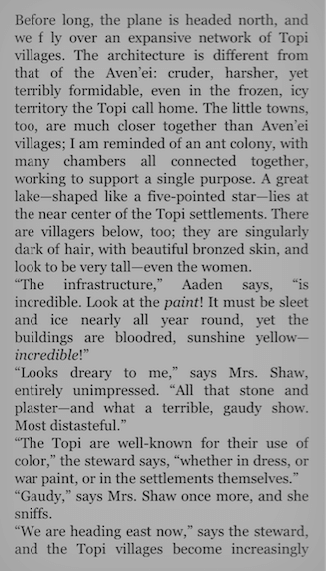
… The architecture is different from that of the Aven’ei: cruder, harsher, yet terribly formidable, even in the frozy, icy territory the Topi call home. The little towns, too, are much closer than the Aven’ei villages; I am reminded of an ant colony, with many chambers all connected together, working to support a single purpose. A great lake – shaped like a five-ponted star – lies at the near center of the Topi sttlements. There are villagers below, too; they are singularly dark of hair, with beautiful bronzed skin, and look to be very tall – even the women. … “The Topi are well-known for their use of color,” the steward says, “whether in dress, or war paint, or in the settlements themselves.” …
Further evidence that the Topi are people and not monster-Orcs comes from the editor’s questions at the back of the book.
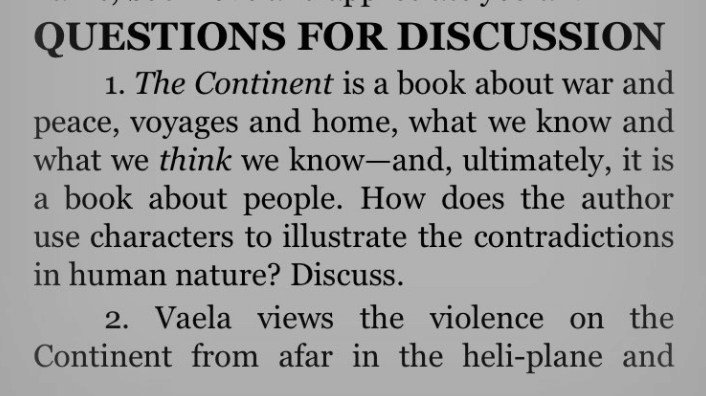
… The Continent is a book about war and peace, voyages and home, and what we know and what we think we know – and, ultimately, it is a book about people. How does the author use characters to illustrate the contradictions in human nature? Discuss. …
Tropes can be subverted. Fantasy authors should know the expectations of the genre and can use that as an advantage to trick their lovely readers into an unexpected ending. Stereotypes are different. Stereotypes are harmful. When they’re translated from the human world and into the fantasy world, that’s lazy writing. But here, Harlequin Teen and Keira Drake have an opportunity to make it clear that the Topi are either monsters different than the human races described in the rest of the book, or work to subvert the racist stereotypes currently at play.
As for the Aven’ei tribe, Drake says:
“In regard to the Aven’ei, this fictional group of people was inspired by a large number of cultures, including Asian and European peoples. The language of the Aven’ei is phonetically similar to Japanese; that is purely because as a linguist who studies four languages, I find it absolutely beautiful, musical, perfect in sound. The Aven’ei are not Japanese. Nor are they Korean, or Chinese, nor are they based on an assumption that Asian cultures are interchangeable. They are a fantasy race: brave, intense, flawed, invented.”
The only non-Japanese thing about the Aven’ei is their tribe name. The names used for the Aven’ei characters are Japanese: Yuki. Noro. Aki. Keiji. These are not invented names. Pairing that with Keiji’s training to become an “Assassin” dressed from head to toe in black brings to mind the image of a ninja. Pairing that with the physical descriptions that stereotypically reference those of Asian descent, we have the Aven’ei’s “almond eyes.” There is no denying the predominant Japanese influence.
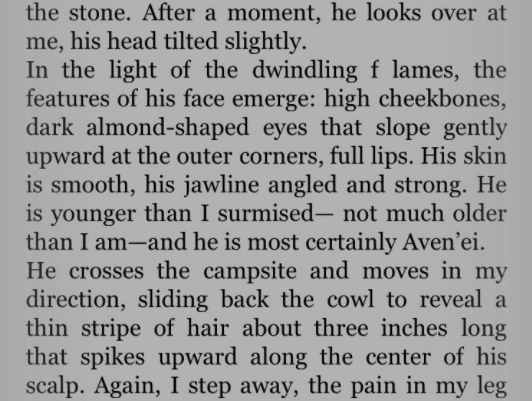
… In the light of the dwindling flames, the features of his face emerge: high cheekbones, dark almond-shaped eyes that slope gently upward at the outer corners, full lips. His skin is smooth, his jawline angled and strong. He is younger than I surmised – not much older than I am – and he is most certainly Aven’ei. …
Keira Drake goes on to say:
“The diverse peoples of the Spire itself are widely varied. This book is a fantasy novel, not intended to represent the cultures of our world, but to express the diversity of appearance in life which is natural and beautiful.”
Now I write directly to Keira Drake. I’m sorry, Ms. Drake. I don’t understand what this means. Respectfully, if The Continent is as you say, an allegory, then it 100% represents the cultures of our world because you’re representing the violence of our world. I want to point out that when creating fantasy, there are few wholly original worlds. The names and descriptions you use are basing things on pre-existing cultures. It becomes appropriation when it isn’t done right. Did Tolkien appropriate Norse culture when he created Rohan? No, but he was a white dude, and the riders of Rohan were good guys. (At least, sexy Karl Urban was.) If you, as you claimed, want to “listen and learn,” then please rethink these things before proceeding with The Continent.
I’m not personally acquainted with Debbie Reese, but I know that she is an expert and scholar in her field. She has also about The Continent, the lack of diverse staffs at publishing houses. If contacted, WNDB would be able to help pair Harlequin Teen with sensitivity readers. Perhaps new clarifications can put to rest the who the Topi and Aven’ei are.
When I read fantasy, I know what people look like based on what is in the text. I know they’re based on a race. The people of Dorne in Game of Thrones aren’t Arab and Mediterranean, but they look it. The people of The Girl of Fire and Thorns by Rae Carson aren’t Spanish and Iberian, but the words are there to represent that it was the dominant cultural influence. The people of The Star-Touched Queen by Roshani Chokshi aren’t Indian, but we know the book is based on Hindu and Indian culture. When world building, you can’t cherry pick the things you like from other cultures, put a new name on it, and hope no one notices the similarities.
I know this is daunting. The idea that you work so hard to create a novel, only to see that it has hurt many people, isn’t an easy realization. Julie Murphy is an example of someone who didn’t get something right in their book, and penned a thoughtful .
For anyone who claims that a “book is just a book” and that this is “just fiction,” reconsider. What was the last book that changed your life? What was the last book that allowed you to feel represented? What was the last book that saved you from hurting yourself? Words matter. That’s why we hold authors to a higher standard when their words cause pain to others. I am not above reproach, and there may come a time when I mess up, too, and I hope I will have the YA Community there to help me right my wrong.
As fantasy authors, we know what inspired us. Culture, race, setting. To deny any of it is a disservice to the people who read our books. When you’re crafting your epic worlds and adventures, keep in mind the people you’re writing for. It is my sincere hope that Harlequin Teen and Keira Drake give The Continent another editorial pass. And I honestly wish them well should they get it right the second time around.
After writing this post, I read the news that the debut group, The Swanky 17s has disbanded following The Continent controversy. My debut year (2012) gave me some of the best friendships I have, and I feel for the authors who will miss out on that camaraderie. My email is open to anyone who has industry questions or just wants to say “hello.” If I can help in some way, I will try.

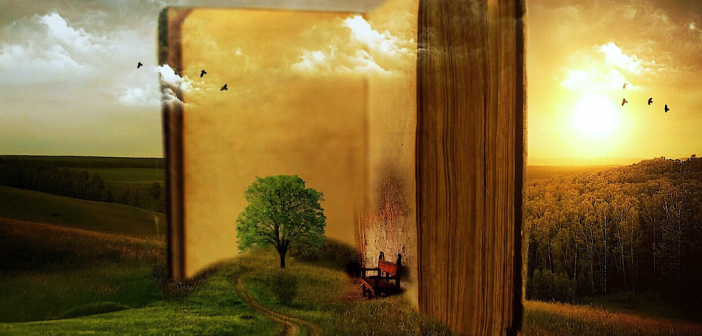
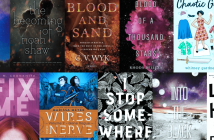


12 Comments
Zoraida,
Thanks for this. I’m waiting for my copy. I’m tribally enrolled at Nambe. I’m 100% a citizen or tribal member there. My mom is enrolled there, too. Prior to marrying my dad and moving to Nambe she was a tribal member at Ohkay Owingeh where her mother was from. Her father, prior to marrying her mother and moving to Ohkay was enrolled at Hopi. So, I have family that is Hopi. I generally refrain from sharing when something I read stings. But, I’m saying it here.
I hadn’t seen that page yet (still waiting for a copy to get to me) where the main character is in a plane looking down at the village. Reading that? It hurt. As I read that, my grandfather (he’s deceased) and times I spent with him came to mind. Hopi, Nambe, Ohkay Owingeh, Zuni, and all the other pueblos? That’s what our villages are like. Our abandoned historical ones, too. Those historical ones (like Chaco Canyon, Mesa Verde)… and the ones we are in today… are communities where the thrust of our work is for each other and our well being. Seeing “ant colony” and “single purpose” — is derogatory and hurtful. I’m glad to know that’s in there. It’ll help when I get the book and start reading it.
I’m sorry this book has hurt you this way.
I think that you’re looking too much into the matter. The author was just telling a story. It’s all fiction. If you think that minorities would be hurt by their ostensible depiction into this book, you are wrong. If you have read the book than you’ll know that they are the heroes/saviors at the end of the story. How is this hurtful? If they are depicted as “uncivilized”, it’s only for the purpose of the fictional worldbuilding. It’s just a coincidence that they have traits akin to Native Americans. End of story.
No *sane* author would ever be a racist with their writing. Plus, need I remind you that Harlequin Teen is an imprint of HarperCollins? It’s one of the big houses. They wouldn’t have published a racist book. They have a reputation to uphold.
AND btw, Justina Ireland does nothing but attack other authors. That lady has made it her petty life’s mission. I mean, just take a look at her twitter feed. Nothing but scalding hate. She is rude, uncouth, and downright pessimistic. I’m quite excited to rip her upcoming book to pieces.
Artimis, I’m guessing:
1) You’re not a minority, so you really have no say in what’s racist and what isn’t racist.
2) I’ve read the book, and you’re actually wrong about them being “heroes” or “saviors”. Drake repeatedly emphasizes that the conflict is a pointless one on both sides; something that they’ve done for 340 years for the sake of kill or be killed. I’m more than happy to cite quotes at you. That’s heroic… how?
3) Drake herself stated that her essay is inspired by IRL events in the Middle East. So protest as you might, but there are clear parallels to the real world that are easily discerned.
4) By your logic, Drake isn’t sane. Because her book is clearly racist.
5) And houses make mistakes, which should be evident by Harlequin’s decision to stop publication.
6) Justina calls it like it is.
I’m going to assume that you know Keira in some capacity, and are here at her behest. While I think it’s great you clearly care about your friend, you really need to ask yourself what you’re accomplishing with your ad hominem attacks. You’re making you look bad, her look bad and it’s not going to accomplish anything.
Jess,
But white people *do* face racism. It’s not exclusive to just *one* race/community. If you have ever lived in a white minority community, you’ll know what I’m talking about. Taking away my right to talk about racism as a white person is like denying me the right to breathable right. Kindly, kindly, isolate your feelings and think objectively. Racism is a universal problem and it should be treated like that.
The ending is subjective to interpretations. But the author (and me!) disagree with you.
Presence of parallels =/= actual world. You can be inspired to write a retelling of a Chinese tale in a european setting, but this does not mean it’s Chinese. (Looks at The Last Airbender. It draws inspiration from so many asian cultures but it’s not asian!) There is a difference between inspired stuff and the real stuff.
Your opinions of Drake are subjective. And kindly do not twist my words. I never said anything bad about her. Own your own words.
The publication wasn’t stopped. It was postponed. Pardon me, but did you even read the whole news?
Justina sure has made some dire enemies. She should watch her words. There could be a far more horrendous reputation to her actions. I’m just having a feeling. No karma goes unpaid.
My sole intention was to discuss the issue with the OP. If you think that I’m making myself (or the author) look bad for just raising my voice, you are wrong. We can disagree but there’s no need to get personal here. 🙂
Hello, Artimis!
The difference between work inspired by a culture like A:TLA and work that uses negative stereotypes of certain groups, as THE CONTINENT does, is that one is a positive representation and one is a negative (and racist) representation. A:TLA is the first. THE CONTINENT is, unfortunately, the second.
As for your belief that racism “is not exclusive to just one race / community” – you are correct. Native Americans, folks of Asian descent, Latinx, black folks – all face racism. But in the U.S, white people do not face systemic racism of the type that we see in THE CONTINENT.
You are, politely, wrong, both in your understanding of racism and in your understanding of this book.
“Justina sure has made some dire enemies. She should watch her words.”
We here at YA Interrobang fully support Justina and her outspoken attitude against racism in books. (We were delighted to see her editor agreed; if you haven’t read his thread on Twitter, it’s a delight – or, at least, a delight if you are a fan of Justina’s work.) We do not believe Justina should watch her words and don’t appreciate the veiled threats.
xx Nicole
I’m sorry you are so misguided and full of hate towards Justina Ireland.
Keira Drake herself believes that her novel is an allegory about violence, and therefore, full of meaning. So you should try to tell the author herself that her work has such little meaning to you. So your argument that the book is coincidentally depicting Native Americans only shows that *you* didn’t read the book or descriptions which I have highlighted. You don’t get to determine that something is racist or harmful towards People of Color. People of Color do.
As for your comment about the end of THE CONTINENT, If you’re referencing the people that “save the day” at the end of the book, then you have a lack of understanding of a White Savior trope. A group of people who have ignored the brutal war on The Continent are suddenly stirred by a nice white girl? That’s still a white savior. That’s still an overused trope. That’s still lazy writing with incredibly convenient timing.
Since your comment is anonymous, I don’t know if you have an understanding of Publishing. A Big 5 would most certainly publish a racist novel. Harlequin does it all the time with their romances. Publishing is 90% white, according to recent surveys, and so how can they understand what is racist when they are predominantly staffed with people of privilege? I’ve worked in this industry a long time, and I have seen racist books go to press. They might not get the same criticism as this book, but it’s there.
Also, Justina Ireland is one of the most supportive authors I’ve seen. She recommends books all the time. The author’s Twitter feed is one I follow. If you see “scalding hate” then it’s because something is racist or wrong. I can’t wait to buy her new books. I think you’re the one who is rude and downright pessimistic. Because I’m very optimistic that Justina’s books will have the support of many people in our industry.
Ta!
~Zoraida
Zoraida,
In case of Ireland, all I will say is this: hate begets hate. I’m only reflecting the bully that Ireland is towards the white authors. I know this may sound horrendous but kindly *try* to empathize. I’m not closed to the idea of subjective criticism, but Ireland makes things personal (calling names to the book/author.) Rude. ;(
Did the author identify the POC as people from specific real-world cultures? NO. Names that are primarily seen as belonging to one culture or society are used all around. They are not always location specific. So, if the author didn’t use the word Japan or South Africa in the book, she sure as hell wasn’t being racist.
It’s like you are saying that Elves from LOTR are white Americans. This is not true because Tolkein never said they were FROM America.
Yes, the trope has been done to death but how is it bad? Are we forgetting that this is all just fiction and written for a specific demographic? It’s not like it’s a lie in its totality. If you are so resolved to compare this with the real world, then remeber that there were some Christian missionaries that removed the evil practices of cannibalism and child marriage from old Africa. I’m telling you this to prove that there *have been* real cases when a certain community did raise/save the other and vice versa. This still does not mean that I believe in the direct relation between this book and the real world.
I never said that being one of the big 5 publishing houses makes them not racist. I’m just saying that they care about the nature of the content that publish and given the latest report, they are making amendments.
I wish I appreciated Ireland like you do, but she gets too personal with her attacks on white authors. This is not right.
I’m sorry to have wasted your time. Haha.
Tc and goodbye.
This probably doesn’t affect anything but I was struck that the claim that orcs are nonentities in Tolkien is just incorrect. They do have names and dialogue, and a whole exchange between Gorbag and Shagrat implies they’re oppressed by their own dark lord and know it, and wish to be free, but stick with him out of fear of the Other of the men of Westernesse.
Anyhoo, just wanted to put in 2 cents. Good article
Zoraida, thank you for this analysis. In the spirit of doing something positive, I am purchasing your YA books for my middle school library. I am always excited to find new PoC voices that I did not know about.
Zoraida,
Did you delete my comment? Can someone explain?
It may have ended up in spam, which is automatically cleaned out about once a week; I cannot find it.